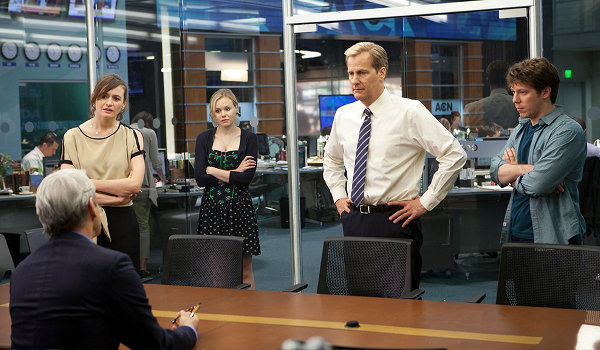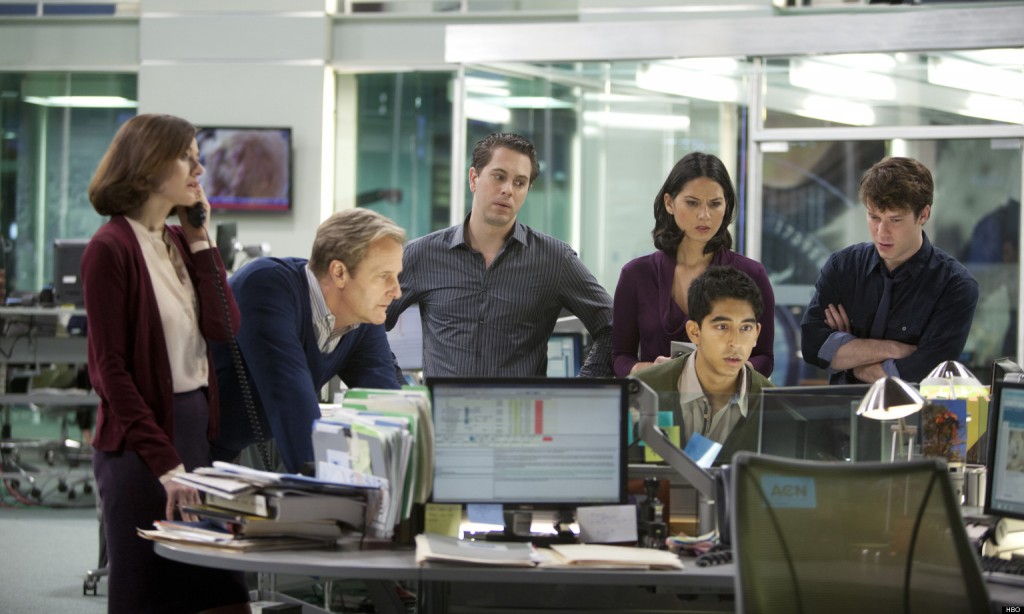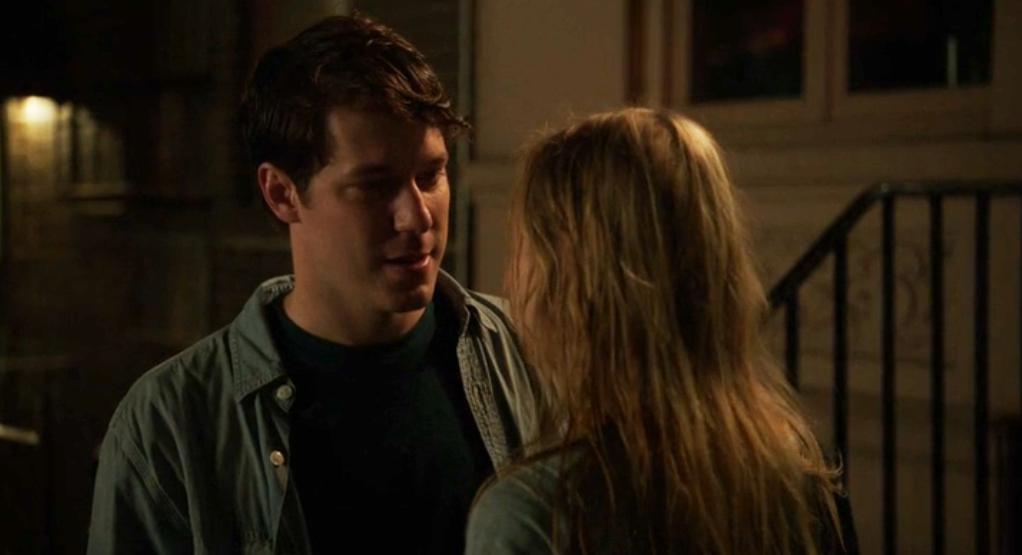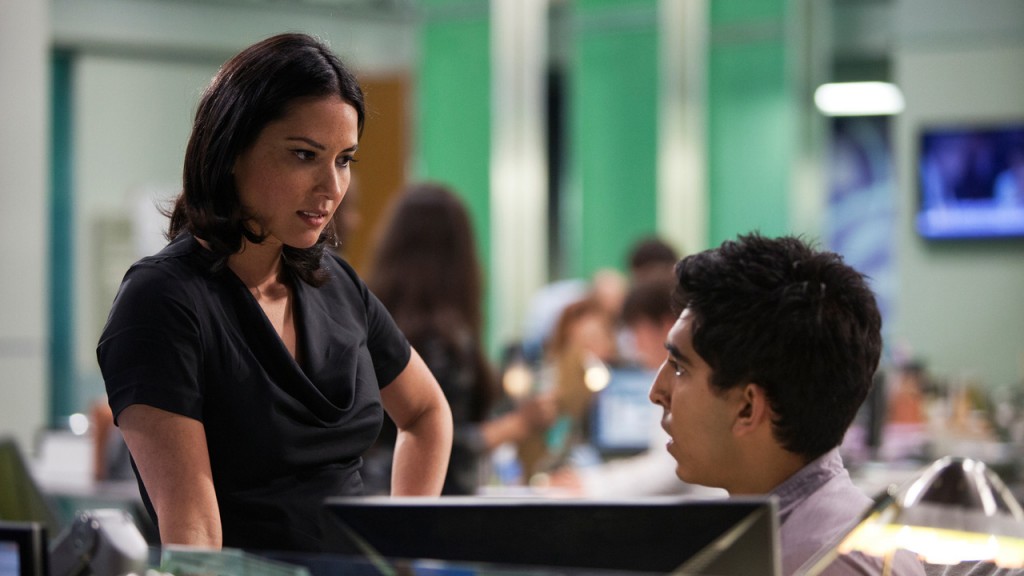
75% of this show’s shot composition is populated by images of white people with their hands on their hips looking contemplative.
I watched all of The Newsroom. All of it.
Every single episode.
Why, you ask? Isn’t it the general critical opinion that Aaron Sorkin’s days as an important voice in television ended the day he wrote the “Isaac & Ishmael” episode of The West Wing? Hasn’t this man ended three series in a row with an episode titled “What Kind of Day Has It Been?” Isn’t he just the Archduke of White Liberal Self-Congratulatory Bullshit?
I mean, yeah, probably. I just happen to like watching his shows, even the not-so-good ones. Honestly, especially the not-so-good ones. Some of you support sports teams who haven’t won a championship in your lifetime. I like to follow writers, even if at some point it transcends genuine fan interest into morbid curiosity. I’ve only ever watched a handful of episodes from Sports Night, his first foray into television. It remains one of those failed series we’d lament the loss of on one of those talking head countdown shows the Trio network used to air in between gags about Dan Harmon’s Heat Vision and Jack and Steven Bochco’s Cop Rock. The West Wing remains one of my favorite shows of all time, despite its considerable foibles, not the least of which was the decision to continue past its fourth season. Studio 60 On The Sunset Strip is a Not Very Good show whose wrongheaded self-seriousness probably made the similarly themed 30 Rock even more popular than it already would have been. Then we have The Newsroom.

Seriously contemplated making a Tumblr out of the ubiquity of this particular pose, but it just seemed too easy.
To say every show Aaron Sorkin writes is the same show isn’t exactly unfair, but it is a bit reductive. Even if you’re not a fan, you’re probably pretty familiar with the Sorkin paradigm: a slew of talented actors portray hypercommunicative uber-intellectuals who spout dry witticisms, condensing politically dense subject matter rife with indecipherable jargon into something funny and moving and also a little cloying, but simple in the way last minute PowerPoint presentations tend to be. As with any writer possessing a singular and identifiable style, there’s the danger that Sorkin’s limited moveset as a dramatist will leave any new work he crafts feeling a little like a Mad Libs book: a recognizable framework with new factors plugged into it; an easily solvable equation. His propensity for recycling narrative arcs, character quirks, and actual passages of dialogue is pretty well documented. If you’ve seen either of the Sorkinisms montage videos (I or II), then you have an idea, but I think this sketch from Late Night With Seth Meyers does maybe the best job.
“The ping pong dialogue?” “The ping pong dialogue.”
Sorkin specializes in workplace dramedies that give him the opportunity to write slightly less-than-hammy soap operas while exploring the inner workings of a specific backstage setting. Following suit, The Newsroom trades The White House from The West Wing and the sketch comedy show from Studio 60 for a cable news network. Anyone familiar with Sorkin’s thematic obsessions might see why this show is essential Peak Sorkin, and why The Newsroom is arguably the best case for him never writing a TV show ever again.
The plot of The Newsroom is pretty simple. Will McAvoy (Jeff Daniels), anchor of the fictional ACN’s News Night, is basically a more nuanced, serious version of the Keith Olbermann facsimiles Peter Krause and Josh Charles played on Sports Night. Will is a former criminal prosecutor who was once a very good, very combative journalist who got tired of getting picked on by the right wing and now lives to serve ratings rather than the news-watching public. His former executive producer, MacKenzie McHale (Emily Mortimer), comes back into his life at the behest of his news director Charlie Skinner (Sam Waterston) to reinvigorate the show and “do the news” without worrying about pleasing everyone. That Mac is also Will’s ex-girlfriend complicates things, and gives the show it’s main soap angle, as Will’s desire to be a better newsman is inexorably tied to impressing and proving himself to Mac. The impetus of this sea change is the infamous “what makes America the greatest country?” scene at least one of your Facebook friends has shared earnestly, mistaking it for nonfiction. It leads to a romanticized quest for the betterment of televised news that openly references Don Quixote every five fucking minutes. The general premise feels like someone jerked off to Good Night, and Good Luck, fell asleep, then woke up during a Lawrence O’Donnell interview shouting “Eureka!” to the skies.
The rest of the cast is peppered with colorful characters like the lovable prick Don Keefer (Thomas Sadoski), his girlfriend Maggie Jordan (Allison Pill), and Jim Harper (John Gallagher Jr.), who falls for the unfortunately taken Maggie. There are other ancillary characters who grow closer to the core as the show progresses, such as Neal Sampat (Dev Patel), who runs ACN’s website, and Sloan Sabbith (Olivia Munn), an economist who later becomes a part-time co-anchor and a pupil of Charlie’s.
The show is generally pretty inside-baseball, but it trades the careful, alt-history pastiche of Sorkin’s past work for an idealized take on our real world. The Newsroom always takes place about a year in the past, so the news stories they’re breaking reference recent real-world events. Sometimes this leads to a very special brand of hand wringing that reaaaally makes you feel glad the show ended before The Newsroom’s timeline caught up to Ferguson or Charlie Hebdo.
For the first season, there’s an ongoing conflict between Will, Charlie, and Mac’s vision for the show, and the network, as embodied by owner Leona Lansing (Jane Fonda) and her son Reese (Chris Messina). This happens to play out identically to the Studio 60 plot arc of “the underdogs pursue a purity in their craft while battling the the evil corporation that doesn’t value quality.” Not unlike the arc of Studio 60, this conflict dissipates once Leona and Reese develop actual human traits and become more fully realized characters. Do you remember in As Good As It Gets, when Jack Nicholson is asked how he writes women? He says, “I think of a man, and I take away reason and accountability.” To write villains, Sorkin has a similar approach, stripping his usually charming and chatty cyphers of any hint of likability, so you’re left with despicable, painful to watch antagonists. Eventually, he feels bad about this and gives them some quips and unearned moments of levity and they swap alignments in no time flat.
The second season is a little more experimental, utilizing a non-linear structure to explore the dangers of getting a big story wrong, as the show’s entire credibility comes under fire for reporting a national story that turns out to be false. Marcia Gay Harden joins the cast as an ACN lawyer, her deposition of the entire staff acting as a framing device for a series of flashbacks. Here the team are their own antagonists, and the season feels like a big exorcism as multiple storylines come to a head, from the Don/Maggie/Jim triangle to the Will/Mac romance. The cast comes out the other side of the arc mostly for the better, ending with Will and Mac getting engaged and the promise of a happier days ahead. Leaving them in a place where they have to dig themselves out of a hole. and using Will and Mac’s love as the lightning rod. was legitimately inspiring, but shortly thereafter it was announced the next season would be the last.
This third season is another beast entirely. Clocking in at only six episodes (the first two ran for ten each), Sorkin bids a fond farewell to the latest world he’s created by serializing a particularly disjointed Newsroom movie. The “Genoa” storyline of false reporting from season two is replaced by a Snowden-y narrative about a whistleblower and the importance of protecting a source, which feeds one of the show’s worst tendencies: to aggressively preach in your face in manner so grating as to incite an oppositional response. Sorkin could write one of these ham-fisted speeches about racial inequality and there’d be a part of me itching to get a Jim Crow face tattoo.
The main problem with this show is how quickly Sorkin and company went from a second season mentality to a tenth season mentality. There are a lot of narrative moves (a rich millennial buying the network, a shock character death, copious flashbacks in the finale returning to the pilot and seeding nonexistent character arcs) that most writing staffs wait to pull out until they’ve waded way further into the pool of the series than they had initially planned. In Sorkin’s case, the third season of The Newsroom is really just the tenth season of the meta show he’s been penning since Sports Night. The cast, setting, networks and titles have changed, but the general theme and forms have remained.
This is evident in how quickly he hit all the usual marks. The structural failure of the lovable team with the greatest intentions (in this regard Genoa is basically President Bartlett lying about MS), the philosophical debate between middle-American values and “East Coast intellectualism” (a dialogue dating back to The West Wing‘s pilot and very poorly executed in watching Matthew Perry write an imaginary SNL on Studio 60) and, my personal favorite, the Sam & Diane, “will they or won’t they” workplace romance that lasts so long that you end up actively rooting against both characters, or occasionally longing for their on screen deaths.

Get a room, you two. Or fuck off. Forever. No, seriously, do whatever, we’ve moved onto shipping any two other characters from this show.
Then, of course, there’s the disturbing need to have nearly every episode include a lengthy monologue peppered with Dad Joke Respectability Politics delivered with the nurturing rigidity of a fast talking White Man Who Is Also A Dick. Jeff Daniels does some fine work on this show and he deserves the plaudits awarded him, but imagine everything Dan Harmon does with Jeff Winger on Community if they weren’t joking AT ALL. Harmon uses Jeff as a mouthpiece, but is acutely aware of how much of a prick he can be. Sorkin speaking through Will and later, Don, does little more than shine a harsh light on some of his troubling gender politics. (This season’s rape allegation debacle seemed DESIGNED to spark an endless thinkpiece parade.) The show tries hard to say some interesting things about the nature of privacy, the utility of the media, and the importance of an informed electorate, but it’s so poorly colored with Old Man Internet Fears and a curious disdain for “citizen journalists” that reeks of protecting the establishment from any voice other than the erudite white one who always knows best.
At this point, you must be wondering why I devoted twenty-six hours of my life to this. There are reasons to watch The Newsroom, believe it or not. If you’re even a casual fan of Sorkin’s pitter patter, it provides a reassuring television experience, a reliable pace and structure not dissimilar to eating frozen pizza when you don’t have the energy to cook. The Golden Age of Television propaganda has led people to expect every hour of programming to be on par with Breaking Bad or it’s garbage, but look, I used to watch every David E. Kelley show, too. Sometimes I just like knowing what I’m in for, even if what I’m in for can be some old bullshit.
“The devil you know…” is a weak argument, so I’m bringing out the heavy hitter.
Sam Fucking Waterston.
Sam Waterston’s work is the beating heart and soul of The Newsroom. Seeing an actor who made fucking Shakespeare out of Law & Order dialogue for years get to stretch his legs and experiment with his image on a whole new stage is a blast, but it’s the specific thing Waterston does with Sorkin’s words. Sometimes a writer gets stale and then a new actor joins the troupe and it makes you rethink those tired rhythms. Mark Ruffalo did it for Joss Whedon in The Avengers, and I think Val Kilmer did the same for David Mamet in Spartan (even if no one saw it), and here, Waterston imbues Charlie Skinner with an indomitable spirit, some serious fucking comic timing, and that special It factor. Waterston does what Martin Sheen, Jack Nicholson, Bradley Whitford, and even Jesse Rosenberg did before him, and that’s present Sorkin’s intent in a way that makes up for his other failings. He also wears a bowtie better than Matt Smith. Fight me, nerds.
I also want to single out Olivia Munn. Never ever being anything resembling a fan of hers, I was against Sloan Sabbith from jump street, especially with that weaksauce “character” of being hot and smart but also awkward. Like, that’s not enough. Being hot and smart and awkward is not a character. It’s what guys write when they think they’re being progressive. But Munn, to my surprise, showed a real knack for the dialogue and developed a strong chemistry with every cast member, making any scene she was in immediately better than it would be without her.
My hope for Sorkin going forward is that he leaves television alone. For awhile. He’s done stellar work with his last two big scripts (Charlie Wilson’s War and The Social Network), and all signs point to his experimental Jobs biopic being really special. Within the confines of a two hour runtime, Sorkin challenges himself to play to his strengths, and to curtail his weaker tendencies. Trying to write every episode of a television series by himself just indulgences every flight of fancy, every overlong walk and talk, and he just keeps photocopying the show he’s already done.
Here’s hoping the next time we see “Executive Producer – Aaron Sorkin” at the end of a show, it’s a true evolution of the form, and not “The West Wing but at a Cold Stone Creamery.”
Wait, but I want that. I want that so bad.
The Newsroom is available in its entirety to subscribers at HBOGO.



